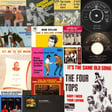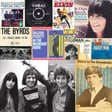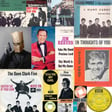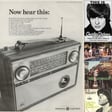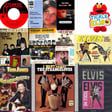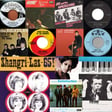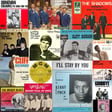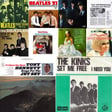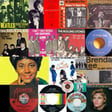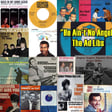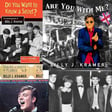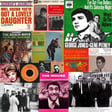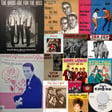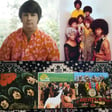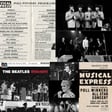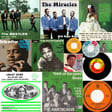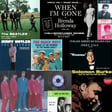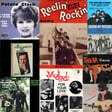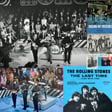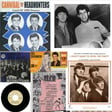Become a Creator today!Start creating today - Share your story with the world!
Start for free
00:00:00
00:00:01

July 1964 (side C)
More of the American charts for July of 1964. The Beatles, George Martin, Lesley Gore, Solomon Burke, Burt Bacharach/Hal David and more. Stick around for a supercut that includes the Carpenters, Luther Vandross (duetting with Aretha) and more! #madeonzencastr.
Recommended
Transcript
Beatles' Motivational Chant
00:00:00
Speaker
The Beatles had this chant John Paul and George and probably then Stuart and Pete had this chant when things weren't going well which in their world wasn't very often because mostly it was an upward trajectory but nonetheless sometimes you know a bad night or the gig we you know didn't work properly or the amps broke or whatever. I say where are we going fellas and they'd go to the top Johnny and I say where's that fellas and they say to the top of most of the papamos I say right and we'd all sort of Cheer up. I'd say, where are we going, fellas? And they go to the top, Johnny. I'd say, where's that, fellas? And they say, to the top of most of the papamos. And I'd say, right. And we'd all sort of cheer up.
Billboard Charts Overview
00:00:57
Speaker
Welcome to Side C for July of 1964, the final two weeks of the American charts, the Billboard charts. I'm Ed Chin. I'm Kid O'Toole. And I'm Martin Cuber. All right, we start with the number one record, which is Ragdoll by Frankie Valli in the Four Seasons. We've already discussed that, but it is the number one record. Yeah, we've talked about it before, but one of their biggest hits, still famous today. Yeah, it is. I just recently watched the Four Seasons film again and it's like, they kind of give this song short shrift in there, but anyway. Alright, I like rising for such a big song as it is.
Frankie Valli's 'Ragdoll'
00:01:40
Speaker
Just a Ladies and gentlemen, please welcome my old friends and brand new Hall of Famers, the original Four Seasons!
00:02:06
Speaker
When she was just a kid, her clothes were hand-me-down. Hand-me-down. They always laughed at her when she came into town. You know what I do now? I work for Joe Pesci, little Joey Fisher, St. Kitty's to smack around. A couple of months ago, we're driving through the old neighborhood. He says, hey, Tommy, how do you remember yourself back then? He says, I think I was a pretty stand up guy. He says, I gotta be honest with you. You were a total prick. Of course, they don't talk about VJ at all. So, you know, Oh, well, VJ who? Exactly. And she's like, Oh, and then we went to another label. Okay.
Beatles' Chart Entry
00:02:54
Speaker
Alright, not quite at the number three where it premiered on the British side, but at number 21, which is still quite a premiere, there's Hard Days Night, the new entry for July from the Beatles. But it will go up the charts really fast.
00:03:23
Speaker
Is that it? Is that the end? Is it what? there. Put it in. Right, all right, George, hold it. Fade, you see. We did that. Oh, no, no, we've done that bit. The train comes in now. We did that to prove that we weren't playing the record then, you see. Yeah, we did that. Because otherwise, at that point, you'll be in here, isn't it? And Capitol learned a lesson as we will discover as we moved on to the next week. As we have mentioned, because UA had the soundtrack, the problem with the contract was Capitol had the rights to issue the same material as singles. o So the Hard Day's Night single was not a UA single, it was on Capitol, and they would release a second single the next week. Wow.
Dixie Cups' Song Critique
00:04:12
Speaker
They learned from the business with VJ. It's like, okay, we got a bunch of Beatles singles. Let's put them all out at the same time. Gotcha. Let's flood the market. Yes. Okay, at number 72, the next song from the Dixie Cups, people say it's a Barry Greenwich tune, it's arranged by Mike Stoller, and it's a Lieber Stoller production. The bass and the drums are really good, but the vocal harmony in the tune itself is slightly standard. I like the horns, but they do get slightly busy.
00:05:12
Speaker
And in the middle, there are those wedding bells again for no apparent reason.
00:05:25
Speaker
And then there's a yeah, yeah, yeah in the fade which is kind of funny
00:05:35
Speaker
The harmonies were fine. The backing track was fine. Oh, and I do like the descending bass line in the chorus. yeah But the lyrics, I mean, they were just so cliche. You almost could predict the next line as you were listening. Don't you ever leave me sad and blue. Don't you ever tell me we are through. Don't you ever hurt me if you do. Everything they're saying will be true. He goes on like that. He's just like, oh. The only thing he's missing is a shooby dooby dooby doo.
00:06:07
Speaker
Exactly! The trite rhymes and images just kind of ruined it for me. And yes, and the wedding bells, as soon as they sing, don't you ever leave me sad and blue, there go the wedding bells. I mean, I guess it's a call back to a Chapel of Love, maybe. They think, hey, we'll remind them of Chapel of Love. That worked really well. So we'll remind them, hey, remember our other single? You don't say They sang it well, but those lyrics just ruined it for me. What made Billboard decide that this was the 53rd greatest girl group song of all time? You got me. That's a shocker. I could think of probably a couple of hundred girl group songs that are better than this. I agree.
00:06:58
Speaker
I couldn't believe it when I saw that fact, that statistic, that they got it at number 53. I thought, oh dear, you guys have got problems.
00:07:09
Speaker
It's okay. but ah It feels like one of those songs which we were complaining about a year ago. Yes. It's like oh well all these girl group songs where all they talk about is finding a boy and getting married. And it's like, well, here it is again. Yes. Chapel love is a little bit like that, but at least it has some life to it. And that's not all it's about. It's like turning on chat GPT or something and then saying to it, please give us the next single by the Dixie cups. Yes, exactly. I mean, that's how the lyrics sounded to me. But that's also another point, Ed, that this sounds very dated. Sorry, Ken Michaels, but very dated. It does. Which Chapel of Love doesn't? Exactly. There's something about Chapel of Love. It's catchy, the production's good. Yes, it is about getting married and everything. But yeah, there's something fresh about it.
00:08:02
Speaker
It's timeless. Yeah, exactly. And then also in the lyrics, there is the line, I don't care what the people say. How many times have we heard that line? It's almost like a meme in these sixties pop songs. Yes. That's true. That is a very popular wine. And I have a feeling we haven't heard the last of that. Not at all. No. It's not bad. It's not one of the best girl group songs ever, but it is just a bit common, I think. Yes,
Solomon Burke's Influence
00:08:33
Speaker
for sure. At number 81, a great song. Everybody needs somebody to love by Solomon Burke. As we will discuss, I'm sorry, I learned this song from the Blues Brothers, and the that most memorable scene in the Blues Brothers. The intro is, once again, a little bit of that Sesame Street intro. Yeah.
00:08:55
Speaker
Yeah, thanks for pointing that out, that Ed, because now I can't get that out of my head when I hear that, but it's true. Talk about a classic. Of course, we love Salomon Burke here, and now it's interesting. It's debated whether he wrote this alone. or whether he wrote it along with Bert Burns and Jerry Wexler. Simon Burke claimed until the day he died that he wrote this alone and that the only reason that Bert Burns and Jerry Wexler are credited as co-writers
00:09:27
Speaker
is that they kind of forced him. In 1997, Burke recalled, when I did it for Jerry Wexler and Burke Burns, they told me that the song would never make it. I said, well, I'll tell you what, I'll give you a piece of it. They said, that's the way we'll get the record played, so we'll take a piece of it. In those days, they took a piece of your songs, a piece of the publishing, but in the end, you didn't have any pieces left. Even now I'm still struggling to get the publishing the royalties and that'll never happen Jerry Wexler then said in a 2002 interview he totally denied that and he said that No, they wrote the song together. um I don't know whatever the case was such a classic I
00:10:25
Speaker
Honey Honey Honey Sugar to kids Baby to miss now Honey
00:10:41
Speaker
if You hear Solomon Burke once again, his gospel background. I mean, he's the preacher here, right? I mean, you hear it from the beginning. Well, that was his story about how he wrote the song. He said he actually did this as a 12 year old in the church. Yes, and you sure hear that. It's not well recorded at points. I feel like at times his voice is a little drowned out, but it's still, it's a classic, it's a soul staple. You mentioned the Blues Brothers and they certainly made this song famous. I have to point out, of course,
00:11:14
Speaker
Another Chicago ding ding ding connection. We all know, of course, Bull's Brothers film was shot in Chicago and that scene where they sing the song was shot at the formerly named South Shore Country Club. The ballroom where it's filmed, my parents had their wedding reception there in the 60s. Wow. and my mother's family remembers. So there you go. Just a little aside. The Blues Brothers, as we were about to get to, were aping the intro of the original record. Solomon Burke very much wanted to make it sound and feel like a live record.
00:11:58
Speaker
I'm so happy to be here tonight. So glad to be in your wonderful city.
00:12:17
Speaker
I love his his little chat where he just goes in your wonderful city. So it could be any city anywhere in the country. It's kind of like Springfield in the Simpsons. Yes. It has universal meaning. I think they kind of overemphasize the live feel just a little bit. You know, the UUUs from the audience get to be ever so slightly too much, although they the use of the horns is really pretty good. Yeah. It's an absolute classic of a song. Some of the instrumentation is done by some of the people from Burke's Church, allegedly.
00:12:52
Speaker
yep so kit Do you think that the sound would have been better if they'd have used the usual people that Wexler would use, basically the Blues Brothers backing band, Cropper, Dunn and those people? Do you think that the music would have sounded clearer and better with them rather than these musicians that Solomon brought in? I think that's quite possible because there is, and in some ways it's good and in some ways maybe not. There is like a looseness to the recording, which as I said, in some ways it's okay to have that loose feel to it. But in other ways, there are times where I wouldn't have minded a little bit of a tighter sound to it with a sound like this. You almost want something a little more professional, like the Blues Brothers.
00:13:41
Speaker
kind of record where you want that tight horned section and you want that. It might have improved on it a bit and maybe Solomon Burke's voice might not have been drowned out at various points and all if maybe the usual crew as you said had been on the record. That's a good point. I could quite easily hear this with Steve Booker T and the horns absolutely in sync with each other, basically doubling or tripling each other and pushing that hook there. I can hear that in this where they would absolutely knock that out of the ballpark. Oh, they would have killed this. Absolutely. Well, I mean, the Blues Brothers backing is so much better than the backing on the record, sorry to say.
00:14:25
Speaker
Yeah, no, it's true. It has that tighter feel that this doesn't. But Solomon Burke's voice is fantastic. John Belushi's is surprisingly good, though. Yeah, it is.
00:14:55
Speaker
I like John's voice on all of the Blues Brothers albums, I'll be honest. And then, of course, the intro from the film where they are aping the Solomon Burke intro. We're so glad to see so many lovely people here tonight. to welcome all of the representatives of Illinois Law Enforcement Community who have chosen to join us here in the Palace Hotel Ballroom at this time. We do sincerely hope you all enjoy the show and remember people that no matter who you are and what you do to live, thrive, and survive, there's still some things that make us all the same. You, me, them, everybody.
00:15:35
Speaker
everybody. And of course, the point is that they are trying to escape from the law enforcement community with the money. And the song allows them to do that while there are numerous representatives of, as they say, Illinois law enforcement there. course that's right With the way from the late, great John Candy from up in the rafters as well. Yep, what a classic. And there have actually been lots of other interesting covers of this tune. The Stones did one almost immediately, and as we keep finding out, the Stones really did just take these songs and run with them ten minutes later. Although the Stones version, it's okay, but it's not great. No. No, I don't think it beats this at all.
00:16:28
Speaker
Oh, yeah. Everybody needs somebody. Everybody loves somebody. Everybody needs somebody. Everybody loves somebody. And I need you, you, you. I need you, you, you. I need you, you, you. I need you, you, you. Beyond that, the faces would do one. Dusty Springfield would do one.
00:17:07
Speaker
The 13th floor elevators would do one. Led Zepp did it live, although they normally did that as part of a medley with a whole lot of love. and you saying
00:17:22
Speaker
Everybody needs somebody to love
00:17:38
Speaker
You've mentioned in the notes Genesis as well, so would that be early period Genesis when Peter was still doing the soul singing? I think that would have been Phil Collins, because I just remembered that. No, I've heard them do that with Phil Collins, like early 80s. Hey, Spacey, we all need someone to love now. Let's put our cars right on the table.
00:18:02
Speaker
Well, I'll leave you with the immortal words of Jake and Edward Blues. And Mr. Solomon Burke, who firstly came to me one day, he said to me, he said, he said, listen, he said, everybody needs something.
00:18:35
Speaker
They also would tend to do it as a medley with satisfaction and twist and shout. Yes. Okay. I think it was part of the medley they did with turn it on again, if I'm remembering correctly. And reach out, I'll be there is also part of it. I better get out my Dutch imports. They did it net worth. Yes. That's where I remember
Shirelles' 'Thank You Baby' Analysis
00:18:57
Speaker
it from. At number 86, Thank You Baby by the Shurels. It's kind of a weird single. You got vibes on it. The sax is really kind of overly tutti to my taste. Good but not excellent vocal. It's pleasant enough, but it's really fairly average, except for maybe that everything's going to be all right bit. I like that a lot, but otherwise it's not a great record.
00:19:25
Speaker
Thank you baby. Thank you baby. Thank you baby. But everything's gonna be alright.
00:19:44
Speaker
Thank you baby.
00:19:49
Speaker
I didn't care for this. It was odd, as you said. It starts with a gospel organ. but And so you think, oh, maybe this will be kind of a gospel tinge number. And then it really isn't. It really isn't at all. It was written by Beverly Lee, a member of the Shirelles. It just wasn't memorable, catchy in any way. I mean, it's one of those songs you kind of listen to it and then instantly forget it. I thought the mix was really muddy, bad recording too. And I guess vibes were a prominent instrument in this, of you know kind of an interesting choice for a lead instrument. I mean, it's not the worst thing I've ever heard, but I wouldn't have picked this as a single at all. I just think it's not in any way distinctive. I felt like I was going to fall asleep listening to it, just nothing to it very much. Me and Eddie going to disagree with this I know, but I actually prefer the B side.
00:20:44
Speaker
That's an interesting song. I prefer Doomsday, the B-side, which is a song before its time in a sense, especially for Sol, where they're talking about the dangers of nuclear war, the high-end curtain and the difficulties that we're having with Cuba, which is quite a subject to write about. It's such a strange song as the other venturing the atom bomb and Judgment Day and then you're sha-la-la-la-la. Yeah, they just don't go together. I like the backing of Doomsday, but the lyrics and kind of what they're singing about, it's 99 Luftballoons 30 years early.
00:21:23
Speaker
I can see how they got there. I mean, it's it's very Bay of Pigs. Yeah, it's it's like Bob Dylan's Masters of War being sung by the Cherones. Fire in Brimstone. la la la You're all going to die. What is this?
00:21:46
Speaker
Oh man, that was an interesting record. And that's written by Luther Dixon and Don Covey. Oh my gosh. Wow. And Marv likes it. I did. I don't dislike it. I just think that the lyrics are just completely out of touch with what they're singing. Exactly. The lyrics would have worked perfectly for a good folk song. Yes. And the music would have been good for a nice upbeat song about love maybe or something.
00:22:19
Speaker
He was just, well, but then they try and turn it into a love song. It's like, oh, but I'll love you until doomsday. Yeah, exactly. All right. i it Yeah, at first you're kind of blocking your head to it. Like, oh, you know, this is kind of good. Wait a minute. Did they just say something about Adam bombs and, and the judgment day? Wait a minute. Well, if it's about someone loving someone until the end, it's almost like preempting Cherish by calling the gang then. Yeah, that's right. Because that's about loving someone and because they're going to die the next morning or something. I guess. Yeah, it's pretty dark.
00:22:59
Speaker
Surely, Aniston sings, surely the end will come. I thought it would be an atomic bomb, but if you should take your love away, doomsday. Surely she must be kidding. but know um la The overstatement of a lyric comparing nuclear holocaust to a broken heart is almost too much to take, but alas, this is no joke. As I listen more and more to her voice, so devoid of irony and smothered in desire, I can't help but be coaxed into her heightened teenage heartbreak as well. This is from a site called Furious dot.com and, well, yeah, I can see it's Furious. and The flip is not a bad record. It's better than the other side. It's an interesting single. We we know where Barry Maguire got his inspiration from now. Even Destruction, yep, he may have listened to this.
00:23:48
Speaker
As 99 Loof Balloon says, everyone's a superhero, everyone's a Captain Kirk, which brings us into our next song at number 87, Looking For Love by Connie Francis.
Connie Francis' 'Looking for Love'
00:23:59
Speaker
This is from the MGM motion picture, Looking For Love. It's another very fifties throwback song, lyrics about driving in convertible cars. And it also feels like a song from a musical, which it is. To me, it's something that Elvis might've turned down and well, it would take a lot for Elvis to turn something down. Barely wrote backing guitars and vocal. Pleasant enough, but not really a tune that is something you want to listen to. And but I'll bring in the Star Trek reference at the end before we move on to the next song.
00:24:55
Speaker
This has got more saccharine than a Willy Wonka chocolate factory.
00:25:02
Speaker
Very, very true. Yeah, when you read about the movie, the corniness of the song and all kind of makes sense. Connie Francis plays Libby Caruso, who has spent a whole month trying to get into show business with her singing yet hasn't succeeded. She then decides to retire and get a job where she can meet the right man and get married. She's interested in pursuing Paul Davis played by Jim Hutton. not Paul Davis, the 70s singer, whom she meets in the supermarket. But Paul is not interested. She later creates the clothes stand called the Lady Valet. And this finally interests Paul, who wants to promote it. And this is great. Paul gets Libby on The Tonight Show, starring Johnny Carson.
00:25:50
Speaker
And Johnny Carson actually appears in this movie. And when Libby mentions that she was formerly a singer, Carson asks her to sing. And so then Libby's career takes off. Paul suddenly becomes interested in Libby, but Libby ends up dumping Paul and falls for a young grocer, played by Joby Baker. but And Paul decides to pursue Libby's roommate, Jan, played by Susan Oliver. It's Hallmark before Hallmark existed. Yeah, that's kind of true. This does sort of sound like a Hallmark movie. So once you know all that, the corniness of the song kind of makes sense. But still, these lyrics don't want to wear fabulous furs. I just want towels marked his and hers. ah It's Jenny from the block 60 years before. That's right.
00:26:44
Speaker
That just visibly made me cringe when I heard those lyrics, but that's the explanation. It's from this movie, as you said, a kind of a really bad Elvis movie and pass for me. Interestingly enough, there is an Elvis connection to this film. Elvis was on the set and Connie Francis ran into him and he said to her, I hear you're using a lot of guest stars in your new musical. How about a job for a hungry folk singer?
00:27:17
Speaker
Could you imagine Elvis just being a background extra? That's weird. Marv, you want to give the Star Trek reference or should I? The female co-star that Kit mentioned is Susan Oliver, who portrays Jan McNair as the name of the character. Okay, Jan McNair, she's played by Susan Oliver, who was a guest star in the Star Trek pilot, The Cage. She's the one who, when you see the opening credits of the original series of Star Trek, she's the dancing Orion girl, the the green lady in that.
00:27:52
Speaker
Oh, wow. Interesting. And they actually would bring the character back just fairly recently because they kind of did a follow up to that episode where they had somebody else playing her, but the character was there. ah Cool. And interestingly enough to take this off of the green girl thing, they sent the film out to the color correctionist and the color correctionist kept color correcting her off of green. They thought there was some mistake in the film. They spent hours and hours putting makeup on and the color correction is, no, no, that can't be right. and So they color corrected her to flash tones until they find that, no, she's supposed to be green. Yes. They kept refilming it and painting it even more green and it kept coming back you know with color correction.
00:28:38
Speaker
Yeah. Oh jeez.
Beatles' 'Ain't She Sweet' & Ray Charles
00:28:39
Speaker
At number 90, the Beatles version of Ain't She Sweet? MGM. Once again, trying to make their bones off of the Beatles. We've covered that on the British side, but here it is. And this is its first appearance on the US charts.
00:28:58
Speaker
Pete, well don't you think that's kinda neat? Yes, I ask you very confidentially, ain't she sweet?
00:29:19
Speaker
At number 91, no one to cry to by Ray Charles. Sorry, Ray. This is Ray Charles sounding like the other Ray Charles. His lead vocal is nice, but behind him, the backing is these easy listening strings and the backing singers, which are just way, way to the fore. It's not great. Holy background singers, Batman. but That's what I wrote. Wow. They repeated almost every line. Way, way overdone. Just so awful.
00:30:29
Speaker
Strings also too prominent. And as you said, Ed 3 Charles, of course, his vocals were fine, but you could barely hear them. It was just so overdone. This has a bit of a country sound to it, which makes sense. The song was co-written by frequent collaborator, Sid Robin, who was a lyricist, wrote for many films, including Westerns. And Foy Willing, who is a singer-songwriter who performed with the group Writers of the Purple Sage, a group who appeared in many western films of the day. Well, it may be a memorable track, but for the wrong reasons. Real messed up, terrible, overdone background singers and and strings.
00:31:10
Speaker
I listened to it and I didn't think much to this version. But while listening to it, I thought, oh, I can imagine the ink spots doing this. And then that made me look and find out that they wrote it back then in 46. And it was released in 1946. The first single version of it was released by the group Sons of the Pioneers. They used to be on the same circuits a lot with the ink spots anyway, which would make sense for me noticing, thinking that But for people who are listening in the UK and thinking, ah this title sounds very familiar, you're right. It was recorded by our good friend Jim Reeves um on the album The Intimate Jim Reeves, which was the first of three albums that he released in 1960.
00:31:58
Speaker
Okay. Actually I'd really like somebody to lift Ray Charles' vocal out of this and then just record new backing. Yeah. That's a good idea. At number 92, Bama Lama Bama Lou by Little Richard, which we covered last month on the British side. Interesting that a Little Richard song is charting later in the States than it did in the UK. And as I recall, didn't do nearly as well in the States as it did in the UK. Although he did get on Bandstand and go and listen to the clip from last month where we played a little bit of Little Richard talking about hanging out with the beetles and the animals ah to
00:32:36
Speaker
our good friend Dick Clark. Ah yes. Which you've all listened to of course because you're all avid listeners of the show. That's right. At number 93, one of Gene Pitney's more classic songs. It hurts to be in love. Those drums, ah the vocal is really good, although it is slightly affected, slightly cheesy. I like the chorus. The organ is annoying. I'm sure Kit will have more on that, but the rest of the record is really pretty good. I also like the stopping and tapping at the end and the drums as the tempo goes up. It may be just a bit much, but I still like it. I don't like the backing singers.
00:33:14
Speaker
to be in love I like this record a lot. Now, here's the interesting thing. It was originally supposed to be sung by Neil Sedaka. It was written by Howard Greenfield. And Neil Sedaka was supposed to sing the lead, and he did record a version of it. But Sedaka's label at the time, RCA Victor, refused to release it because he hadn't recorded it in their studios. And that was stipulated by his contract.
00:34:11
Speaker
So the DACA recorded another version of the song in RCA Studios, but for whatever reason, it didn't work out. Now it didn't have the right sound. And so I cry a little hate to be in love. Oh, die a little hate to be in love. Day and night, night and day, it has to be in love this way.
00:34:51
Speaker
So Howard Greenfield and Helen Miller, who co-wrote the song, I should say, offered it to Gene Pitney. So they took the existing musical track and replaced Sadaka's lead vocal track with
Gene Pitney's Musical Elements
00:35:06
Speaker
Gene Pitney's. So everything on this track is Sadaka's, including his own arrangement, backing vocals, piano playing, and the female backup singers that Sadaka usually use. That makes sense. Yep, they just replaced the lead with Jean Pitney's voice. I don't like the organ, particularly in the instrumental section. But I love those thundering drums. I like the catchy lyrics. Day and night, night and day. You know, it's it's darn catchy. I like Jean's phrasing. She will never want you no matter what you do. it's Some nice touches. And I assume, of course, Neil Sadaka had done the same thing.
00:36:10
Speaker
And I love the stamping feet that stop adding to the percussion. You know, there's just something off kilter about it. It's not a typical pop record. It would have sounded very different for Nilsa Dakka. It's kind of Dave Clark Five, actually. Yeah, exactly. That's a good point. It does sound more like a Dave Clark Five. I like this record a lot. i and Gene Pitney did a great job. I think he has a real power here that I think he almost better than Nilsa Dakka would have. Okay. Okay. I do like it, but the backing singers, what you said about Neil Sadaka now makes sense. Because the backing singers are doing something that they do very often on Sadaka songs. We'll find it later on a, I've got to say, a much worse song later on by Neil Sadaka. So it makes sense with those backing singers on this. But my only issue with the backing singers is that sometimes they get in the way of Gene's voice to my ear. When you listen to a Gene Pitney song, you expect that big voice to be the main thing there. And it's almost like to me, the backing singers were almost getting in the way of, occasionally, of Gene getting that big voice out there.
00:37:22
Speaker
But that makes sense, though, that he couldn't sing exactly the way he normally would. Exactly. Yeah. Yeah. Mm hmm. Yeah. What's missing is the drama that you kind of always expect from Gene Pitney. Absolutely. Yeah. Yeah. And he couldn't do that because he's doing it to an arrangement that was for Neil Sadaka, who is a much more laid back pop singer. Yep. At number 95, A Quiet Place by Garnet Mims and the Enchantors. It's a pretty standard duop song, I think. It's pretty good. It's a nice and enough vocal. That Johnny Dollar stuff at the beginning. he
00:38:00
Speaker
so So it was written by ah Norman Mead, whose real name is Jordan Ragavoy, although Marv is going to have some comments on that. The same folks who wrote Time is on My Side. Yeah, very interesting that the same person wrote this song that wrote Time is on My Side. I can't get no sleep in this noisy street. I've got to move, I've got to find me a bottle.
00:38:30
Speaker
tell me where do you go when you've got no dough that must be a way out of here well i've got to survive the peace of mind that must be
00:38:48
Speaker
I felt like Garnet Mims and the Enchantors and the songwriters were trying to sound a bit like the Drifters here on and up on the roof, but they can't duplicate that sound. This doesn't work. It's a good vocal, as you said, Ed. I like, though, how the lyrics go through how noisy his neighbors are going through different neighbors about why they're so noisy. I like the smoothness of the vocal, but other than that, I just find this kind of a pale imitation of the Drifters and up on the roof. I mean, we've talked about Garnet Mims and the Enchanders before, and I just feel like they've done better work. There have been better songs than this.
Garnet Mims vs. The Drifters
00:39:23
Speaker
It's interesting you to say that about the Drifters, because I have a quote from a reviewer.
00:39:28
Speaker
who Okay, this song outdrifts the drifters, melding mims gospel i know it is like esy that melding Mim's gospel singing roots with the nighttime urban environment in soul's gentle riposte to rear window as Mim's list all of the different things that disturb him as he tries to sleep. Hmm, interesting. I see what they're saying about the urban sound. Saying, you know, trying to sound, I don't know, sophisticated, smoother, maybe, you know, smoother quotes, more sophisticated, but that's funny. mean As you say, it's it's an up on the roof. They're trying to also compare it to up on the roof. Yeah, yeah that's fascinating, but no, they do not outdrift. They do not outdrift the drifters. No, disagree. ah We're gonna have another review for this next song, then we'll see whether we agree or disagree with
Henry Mancini's Theme Review
00:40:25
Speaker
it. The song is Shot in the Dark by Henry Mancini and his orchestra. It is the theme to Shot in the Dark, which is the second Clouseau film. The sequel to The Pink Panther. It's slightly similar to the Pink Panther theme, but it's a lot more spy sounding.
00:40:43
Speaker
ah Lots of horns, like the Pink Panther theme. It's kind of an interesting use of instruments, but I find it a bit of a lesser song, less record to listen to, and more something to play under the credits. However, I found a review who really loves this song. They claim that the guitar riffs over the walking bass and the brass cuts in and out. The sax that kicks in at one minute and 14 seconds takes the track to another level. This is one of the best songs from Henry Mancina. Excuse me.
00:41:56
Speaker
I don't agree that it's one of the best. First of all, I love A Shot in the Dark, the movie, the movie classic classic classic movie. But I think this song works within the movie. It's great for opening credits. Would I listen to this separately? Do I think it works just on its own the way the Pink Panther theme does? No, I don't think it's quite as memorable. It's Henry Mancini, incredible composer, but I just don't find it as memorable and enchanting on its own as the Pink Panther theme is. I just don't. But working within the movie, sure. Yes. But no, I wouldn't say it's his all time best. And I would sit and listen to it without the context of the film. No. I could name at least half a dozen or more tunes by Henry Mancini that I put before this.
00:42:46
Speaker
Absolutely. Moon River, people. Yes, Moon River, come on. I do like the sax at a minute, and I also like the guitar riff over the walking bass, but those are pieces that's not a song. Yeah, it's got its moments. I do like this as background. It's nice in the background. I think we're all kind of in agreement here that it's perfectly good theme music, and it may even be great theme music, but it's not a song. Right. The guitar is almost Peter Gunn styled. The Peter Gunn theme is a song. There's just not enough here to make it carry like the Peter Gunn theme.
00:43:21
Speaker
Right. I've always really enjoyed the film. but so It wasn't originally supposed to be a Cluso story, you know? Really? It's based on a play. So there was a play called A Shot in the Dark, which had another character in it. It was different. But Blake Edwards saw the play, Blake Edwards, the film director and husband of julie andrews and that he saw the play he liked it and he saw a possibility there because there was humor in the play as well he saw a possibility of merging it with the inspector kluzo character so he got in in touch with i think it was united artists that had the rights to
00:44:01
Speaker
the Pink Panther films, and they actually optioned to make a film of it, and they bought the rights to it to make a film, and they inserted the Inspector Clouseau character into the story for the film. And you've also got in the film the first instance or appearances of the characters Chief Inspector Dreyfus, played by Herbert Long, and Burke Quoak as Cato. They didn't appear in the first Pink Panther. This is their first appearance. Well, that kind of solves a mystery I've always wondered about is that, you know, the other Pink Panther movies have always been, you know, the return of the Pink Panther, you know, Pink Panther always has appeared in the title. And I always wondered why this was called a shot in the dark. So thank you. You've solved that mystery for me.
00:44:49
Speaker
There you go. Now we know. we go So we move on to the next week, the final week of July, July the 25th, 1964 on the Billboard charts, as we mentioned at the top of this show, ever so slightly a return to the
Beatles' Chart Dominance Recap
00:45:04
Speaker
mania. The Beatles would have four songs on the charts, A and B sides of two singles, because Capitol had to outdo U.A. and its soundtrack. So they issued two singles in two weeks. Meanwhile, UA also would have some success with a George Martin single featuring a couple songs that are off of the soundtrack. At number one, still is Ragdoll from Frankie Valley in the four seasons. Moving up from number 21 to number two is Hard Day's Night. So on the prayer side, it moved from three to one. On the US side, it moved from 21 to two in two weeks.
00:45:46
Speaker
the things that you do to make me feel okay.
00:46:02
Speaker
So why aren't you at home? Cause when I get to
00:46:11
Speaker
The single was a Hard Day's Night, back with I Should Have Known Better, released on the 13th of July 1964. Because they had to steal one more song from UA, this single had a different b-side than the British Hard Day's Night single. The British single had things we said today. Here, we got I Should Have Known Better. At number 67 is Ain't She Sweet, so that's moved up a little bit.
00:46:44
Speaker
At number 75 is that B side? I should have known better.
00:46:51
Speaker
and Oh, hold it. One, two, three, four.
00:47:09
Speaker
From the top in your own time. And at number 80 is And I Love Her. My kiss my lover brings She brings to me a lover A love like us could never die As long as I
00:47:43
Speaker
Released the 20th of July 1964 and I love her back with If I Fell. Oh, what a single. lovely Paul McCartney says, the and in the title was an important thing, and I love her. It came right out of left field. You were right up to speed the minute you heard it, Paul said. The title comes in the second verse and it doesn't repeat. You would often go to town on the title, but this was almost an aside. Oh, and I love you. And we got have a review from Cashbox, which, you know, we love these reviews and I'm sure you're going to love this one. They describe the song as extremely pretty, a soft beat cha-cha opus, and that the Beatles wax in soft and soft in tender fashion. A soft beat cha-cha opus. At least they didn't call it a thumper. Every other song, it's a thumper.
00:48:40
Speaker
You just sort of got a cha-cha to it, yeah. Yeah, it does. Ever so slightly, but I still wouldn't use that to describe it. Yeah.
Elvis vs. Drifters' 'Such a Night'
00:48:50
Speaker
At number 82, Elvis with the Jordaners, the song is such a night. We mentioned the Drifters. This is a cover of a Drifters tune written by Lincoln Chase. I much prefer the Drifters version. Elvis' vocal is fine, but the record itself is really pretty mediocre. It's the Jordaners backing which just tanks this record for me. It's too busy and it ends up hurting the record. Well, I think I liked it a little more than you did. i like that it sounds like sexy raw kind of Elvis. It's not some of the others that we've heard in recent shows where it's a little more tame, a little more commercial. Now it's interesting, Elvis actually recorded the song in 1960
00:49:37
Speaker
for the album Elvis' is Back. And then it was released as a single in 64. And I'm assuming it's the same version. It's the same song. i wait Why did they wait so long to release it as a single? Didn't really find an explanation for that.
00:50:09
Speaker
I particularly found it fascinating when you listen to the original and then listen to this. You can really hear how Clyde McFatter, who was still with the Drifters when Drifters recorded the original, you can really hear how his vocal style influenced Elvis's certainly on this song, but I think maybe in general, you know, down to the gasps and the hiccups and Elvis really emulated. How well I remember, I'll always remember. Ooh, that night, ooh, what a night it was, it really was such a night. Came to dawn and my heart and her love and the night were gone. How well I
00:50:59
Speaker
Ooh, what a night. Ooh, what a night it was, it really was. Such a night. Came the dawn, and my heart in the rough, and the night was gone. But I'll never forget the kiss of the kiss in the moonlight. Ooh, such a kiss.
00:51:22
Speaker
the Drifter's version is much more doo-wop. I thought it was okay as well, and I picked up on that as well, especially with the laid-back of, oh, such a night.
00:51:40
Speaker
I'll always remember. Ooh, that night. Ooh, what a The way that he delivers that, that reminds me of the Drifters version as well where that's Torque Sang essentially in the original Drifters version and Elvis does his own variation of that as well.
00:52:15
Speaker
Yep. So you like the backing more than I do. Like you say Elvis's vocal is fine. And I agree with you. It is to a great extent, a copy of the drifters original, but the backing is just too much. I mean, and normally I like the Jordan airs, but here, not so much. No, no, the backing didn't bother me as much. This is one we disagree on. We disagree on Elvis quite a bit, don't we? And the thing is I like Elvis. I want somebody to pull out Elvis's voice on this, leave some of the instrumentation in there, and then put AI in or somehow get the original from the drifters and put them backing Elvis. There you go. Now you're cooking with gas. Now we're all just playing Giles Martin, aren't we? We are. There you go. Off you go, Giles. That's right. We want it ready for when this episode comes out.
00:53:14
Speaker
Ooh, such a kiss Such a night It was a night And the dawn had my heart and my love and none was gone But I never forget the kiss and the kiss and the moonlight Such a kiss Ooh, such a night Now she's gone, gone, gone
00:53:53
Speaker
At number 85, I'll keep you satisfied. Billy J Kramer and the Dakotas, we covered that on the UK side. It would reach as high as number 30 in the US on Billboard. And it got to number four in the UK.
Leslie Gore's Catchy Production
00:54:08
Speaker
At number 88, Maybe I Know by Leslie Gore. It's an Ellie Greenwich Barry song. It does manage to be catchy. It's better than a lot of the other Leslie Gore songs we've had. It's a little bit repetitive, although the Quincy Jones production saves it. It's still not quite a return to form. There is a clip on YouTube from a rock documentary where they describe her as the girl next door who had dating troubles, which is not a description I would have come up with, but I get it. That works.
00:54:44
Speaker
The lyrics here are still lacking a bit. He really loves me. That's all I can say. And that same clip that I mentioned also has an excerpt of Leslie doing this on the Steve Allen show. It's a really hot version of the tune, but unfortunately they just really didn't know how to make her look good on television. They poured on the makeup and the outfit she is wearing is not attractive. No, it's not flattering. Now, get ready for these descriptions, guys. the Well, this is fine. Billboard described the song as a medium tempo rocker with a fine dance beat. Now here's Cashbox. This is awesome. Hand clapping, not handclapping hand clapping, hand clapping, thumper, geared for easy dancing and listening approval and a tuneful teen angled vocal romp.
00:55:42
Speaker
ah yeah Yeah. It is a crystal clear production. That's Quincy all over. The hand clapping and percussion is catchy. And of course, Leslie Gore. I mean, she has such a great voice. She sings it well, but I'll tell you those lyrics. It's another one of those cringe worthy. You can cheat on me, make me cry, do whatever you want to me and I'll keep coming back for more. kind of songs. I just wrote stop. Maybe I know that he's been a cheat and maybe I know he's been untrue, but what can I do? My friend's telling me he's no good. He isn't treating me the way he should. He really loves me. That's all I can say. Before my tears fall, I just walk away and later on deep down inside, he loves me though. He may run around deep down in inside. He loves me someday. He'll settle down. Nope. Dump him.
00:56:36
Speaker
That's my response. I can't stand these songs that they used to make her sing. What are these messages that they were sending to women back then? Good lord. That goes perfectly back to that description from that documentary. It's like the girl next door who had dating troubles. That's the box they put her in. She deserves so much better than these songs. It isn't even memorable. I mean, it's my party, you don't own me. And Judy's turn to cry. no Those were her three top ones for me. And it's just a shame she was saddled with stuff like this. But do you think this is slightly better than some of the other ones we've had? Slightly. But this really isn't great. Those lyrics just make me cringe. like It's hard to get past them.
00:57:43
Speaker
Those hand claps in the bridge. Did you try to follow them at all? the In the verses and the choruses, you've got them clapping on the first beat. So the song's in a four-four, so you've got one, two, three, four. So if you want to break it up, i'm going I'm going into the weeds here a bit. So I've always had a love of rhythm in music, hence playing bass, but also doing percussion as well for groups. so what they're doing here is so if you go at one and two and three and four and then on the end between the double clapping there which is really really tricky to pull off and they pull it off really well so it's not on the four and it's just after the end but before it comes back to the first beat and it's perfect in that area and that they land it every time
00:58:48
Speaker
You noticed that as well, Ed? Yes, I did. But it's really tricky to pull that off. I'm gonna listen to that again. It reminds me of what he would do in the 70s and 80s when he'd start playing more with funk rhythms and disco rhythms, in essence, and what he'd do with Michael Jackson, with those really strange, offbeat percussion. I will give that another listen. I'll just ignore those lyrics and and focus more on and that. Yeah, listen to the hand claps in particular. The hand claps as opposed to the drums. Okay. At number 89, I want you to meet my baby by Edie Gourmet, a man in wheels song.
Edie Gourmet's Youthful Attempt
00:59:30
Speaker
The horns are overdone and way too busy. Although I do kind of like the middle eight, it's ever so slightly
00:59:38
Speaker
Blee, the drums match up to the You Can't Love vocal, and you got some hand claps which are appropriately of the era. And this one was arranged by Robert Mersey, who we've discussed before. Right.
01:00:21
Speaker
Other than that, oh boy. To quote from the song, and those of you who haven't heard it yet, you may not get this until you hear it. Aye, aye, aye is right. Ay, ay, ay, as she kept repeating. Yeah, this song, she deserves so much better. She's such a great singer. I just felt like this was another cookie cutter, real building song. They're trying to make her sound younger and it just didn't work. Everything about it just really
01:00:52
Speaker
irritating. But yeah, that aye, aye, aye, aye is right. That really got on my nerves after a while. But it was just a shame she was such a good singer and of course great with Steve Lawrence. And these pop singles she was doing during this period just really didn't do her any favours. And this is a great example of that. In some sections it seems like they're trying to do Blooby but failing miserably. Apologies to Edie Gorms, maybe two or three fans that she's got left in the world, but I really did not like this song at all. No. Another one to AI the Applejack's eye eyes over, huh?
01:01:36
Speaker
And Frankie Valli's. Yeah, was this aye aye aye thing? Was this a trend of the time? Another meme, I would say. Aye aye aye. At number 90, Hellamata Hellofata, the 1964 version by Alan Sherman. Mars first comment when he saw this was, didn't we already do this?
Alan Sherman's Sequel Criticism
01:01:56
Speaker
No, we didn't because Alan Sherman recorded a sequel song, which was also known as Return to Camp Granada. Same tune. The kid is going back to the next year and writing a new letter home. Hello, mother. Hello, father. I am back at Camp Granada.
01:02:21
Speaker
The melody is from the ballet Dance of the Hours from the opera, La Geoconda by Poncelli. There's one line that I do really like in there. We're all tired of Mother Goose here, so next Friday we're having Lenny Bruce here. Quite a reference in a kids song at the time. Other than that, it's pointless. I thought the jokes ate better. Yeah, the Lenny Bruce joke is the best line in the whole thing. Other than that, just thought it was, you know, kind of funny the first time, but now this is beating a dead horse. I mean, I just feel like, as you said, why? It wasn't nearly as funny or anything as the first time. I mean, I thought even the audience gives us, of course, a live recording. Even the audience at times sounded bored. Pointless. Skip. Yeah. Two or three jokes landed. And yeah. Yeah.
01:03:15
Speaker
Which is sad because the original is still such a kid's classic. It was a staple on K-TEL records alongside my ding-a-ling from Chuck Berry. That's right. And we're thinking if we did another sequel to this, it would have been more like Hello Murder, my father. And the joke about the swimming instructor who looks like a whale. Oh, that's just dope. Boy, that has not aged well. I mean, when I heard that too, I thought, wow. Neither is the mention of the word sissies. Yeah. Parts of this definitely have not aged well. No. And despite all that, it's still a better record than Pop Tates the Beatles.
01:03:54
Speaker
I guess that's true. Yeah, that's pretty dreadful. Which is Alan Sherman's other known single from right around this time. Yeah, it's pretty dreadful. At number 92, a much better song. a house got a home The Brooke Benton version by Hal David and Burt Bachrach, a really great smooth vocal, although the backing on this version is really not all that well recorded. The Dionne Warwick version, which was also out around this time, is much better backing, and I prefer her vocal, although you could do with either one, I think. yeah yeah
01:04:31
Speaker
Don't let one mistake keep us apart I'm not meant to live alone Turn this house into a home When I climb the stairs And turn the key Oh, please be there Still in love
01:05:00
Speaker
I love this song. I love it, love it, love it. I was so thrilled when I saw that this was on the charts and we'd be talking about it. It actually comes from a 1964 film of the same name starring Shelley Winters and Robert Taylor.
'A House is Not a Home' Praise
01:05:19
Speaker
And of course it was, indeed, as you said, ed recorded by Dionne Warwick. And that was released and it ultimately peaked at number 71 on the Pop Singles chart. And it was a B-side, actually, of Top 40 single called, You'll Never Get to Heaven If You Break My Heart.
01:05:36
Speaker
Now this version the bur benton version was the version that appeared in the film and it debuted two weeks before Dionne Warwick's version and this ultimately peaked at number 75. So it's amazing as great a song as this is that it wasn't a bigger hit for either of them. But it went on to achieve greater renown through multiple covers, including my personal favorite, Luther Vandross's cover in 1981. I love his version. That may be my favorite. He turned the song into something else entirely. and Phrasing and all is just to me, love the production on it.
01:06:20
Speaker
And then he turned his version into a live version which he did with Aretha Franklin. Spoiler, we're we've got a supercut coming up and you really see how great a song it actually is. The Vandrossen Aretha Franklin version is just fire. Yeah, exactly. It's six minutes and it's just amazing stuff. Yep, and and if you want to see him singing it alone, of course, you can go to his album, debut album, Never Too Much. And there's also a version, I've done it to ah Martin and Ed, him singing it on Soul Train in 1982. It's the backing, the studio recording, so it's not live and in terms of the backing track, but he sings it live. Oh my God. As far as this version goes,
01:07:03
Speaker
I agree with you at the backing. It's a little overproduced and a little over-ranged with the strings and a little too much reverb, I think, on Burke Benton's voice, but it is still very powerful. And the lyrics are just so moving. It's Burke Beckrick and Hal David. it's It's just classic, gorgeous chord changes, meaningful lyrics. It just doesn't get any better than this. Yeah, you can't get better than the perfect love song, which is exactly what this is. yeah I'm wondering if, because of this song by Brooke and the other version by Dion only getting to that sort of level,
01:07:42
Speaker
Do you think there's any correlation with the fact that at this time there's no R and&B chart still with a billboard and if there was it might have got more traction through being on the R and&B charts and that giving it more play perhaps and making people aware of the song more? That absolutely could be because there was an R and&B chart in the Cashbox and both of them because, you know, as we know with Cashbox, when there are two versions of the same song that came out, they would group them together. It made the top 10.
01:08:14
Speaker
The R and&B in cash. So you are on to something there, my friend. Absolutely. Except that I would say that as an R and&B song on the R and&B charts at this point in time, it would be much less likely to hit in a wider audience. It might have helped sales. on the African-American side um ah in those communities, but to the record buying public in general, I don't know. It's just astounding that it didn't do better. Agreed. Because it's just a stunning song. It is.
01:08:48
Speaker
So some of the versions you will hear in the Supercut, which is coming up, in addition to the Dion Warwick version, we've got Shirley Bassi, we've got Dusty Springfield and Burt Bacharach. They didn't do it as a duet, but each of them did pieces of it. You've got Luther Vandross and Aretha Franklin, which we mentioned, they did do it as a duet. You've got Mel Torme, you've got Ella Fitzgerald, you've got Karen Carpenter, along with some tremendous piano from Richard Carpenter. And you got the reggae disco rockers, which is interesting. Interesting. It's not bad, actually. You know, it all fits. Gerald's is stunning, too. And when, you know, I heard this. Wow. Of course, it's all if it's Gerald, what do you expect? But she does a beautiful version as well.
01:09:52
Speaker
A chair is still a chair Even when there's no one sitting there Oh, but a chair is not a house And a house is not a home When there's no one there To hold it tight And no one there, you can't kiss Goodnight A room is still room Even when there's nothing there but
01:10:49
Speaker
But a room is not a house And a house is not a home When the two of us are far apart And one of us has a broken
01:11:24
Speaker
A crazy game when you act in tears Don't have a heart Don't let one mistake keep us apart
01:11:56
Speaker
I'm meant to live alone Turn this house into a home When I climb the stairs and turn the key Oh, please be there still in love Still in love
Luther Vandross' Rise to Fame
01:12:20
Speaker
I'll still be in love again
01:12:26
Speaker
I will, I will. I will, I will. The question is, still. And yeah. Do you love me?
01:12:47
Speaker
Yeah. Yeah. Yeah. Yeah. Please me. You know I will. Spilling, stealing love I love it I love it How about y'all? Do you love it? Do you love it? Yeah
01:13:16
Speaker
I wanna be in love with me I want you in need of me
01:14:32
Speaker
We're going to allow Ed now to go on a tangent about Luther Vandross since we've mentioned him in passing. Yeah, so Luther Vandross was actually discovered, more or less discovered, not completely discovered, but he came to prominence because of David Bowie. And he appeared as a backup singer on the Young Americans album by David Bowie. Now, we don't know this for a fact and we have no interview clips from any of the main folks indicating that this actually happened, but I'm going to imagine in my headcanon, very young Luther Vandross ran into ah John Lennon because John Lennon worked with David Bowie on the Young Americans album. You had the fame and you had the Across the Universe cover, so we'll leave it at that.
01:15:21
Speaker
Yeah, they met. They they possibly met. Well, that's something we can ask Earl Slick the next time we run across him. That's right. He might know. Who knows? At number 94, Ringo's theme, this boy by George Martin and his orchestra, this is the UA single, and this was the B side of the UA, and I love her instrumental, which
George Martin's 'Ringo's Theme' Appreciation
01:15:45
Speaker
did not chart. it only reached as high as number 105 where it was bubbling over. This is the song that all of us who grew up with the American albums, other than the Beatles songs, this is the one that we really remember the most. And this is probably the best of the George Martin instrumentals on the UA Hard Day's Night album. I remember this very fondly. This was the one instrumental that I would play.
01:16:42
Speaker
I just think this is so well done. I love the guitar on this, too, which apparently was played by Vic Flick, you know, in English studio guitarist best known for playing the guitar riff and the James Bond theme. Such distinctive guitar. You could definitely hear the James Bond influence here. You could just visualize the scene, right? the canal side With the kids walking along and playing the sad sack. that melancholy kind of feel. And even though, of course, Ringo later said he wasn't melancholy, he was swung over. But we'll just go with the melancholy ah ah description. It's just perfect. It just showed how talented George Martin was at arranging, at you scoring, orchestration. Classic. Love it.
01:17:30
Speaker
Yep. Can't say it better myself. Brilliant. You listen to this and you you picture Ringo walking at the the side of the the canal and the kids as well. Yeah. You can just visualize it when you hear it. Other than the film, were you that familiar with it? The George Martin soundtrack was not part of your childhood. Whereas for Kit and myself, all we had was the American albums and sometimes we would skip over the George Martin instrumentals, but more often than not, it was too much trouble. Yeah, I did find it interesting when it came up that it was an American charting single, and then it made me remember that, yes, of course, it was a soundtrack album with George Martin's instrumental pieces on there as well. So, yeah, it was interesting to hear. so But no, I don't remember it as a single. But yeah, that's how I remember it is the background of that section of the film. And that's an oboe in there, right? I ah think so. It seems like it to me, which just kind of would make sense.
01:18:25
Speaker
yeah Yeah, it's definitely not a tuba and it's not anything less sort of more treble-y. So yeah, it sounds more obo-ish to me. That would be right in George Martin's wheelhouses and arranger. No, it's not George Martin playing it obviously, but no just a question. At number 95, Summer Means Fun by Bruce and Terry. Very much a Beach Boys copy number, a standard by the numbers beach song. The guitar is good. The backing vocals are fine, but we have heard it all before. Nothing new here, but it's still a pretty good single.
01:19:11
Speaker
Yes, it's never been fun Fun fun, summer needs sundowns But every girl's a doodle sundowns Lots of fun for everyone now So come on everybody get your bags and bikinis cause it's only just begun We're gonna never fall until we're far now Summer needs fun, summer needs fun Yeah, I mean, this definitely is a ah Beach Boys derivative song, but it's good enough. Kind of a notable song. This was Bruce and Terry's last chart single because the following year, Terry Melcher was spending his time producing The Birds and Paul Revere and the Raiders. And Bruce Johnson would, of course, join the Beach Boys. I can't imagine why they'd want him.
01:20:06
Speaker
I mean, he sure had the Beach Boys sound down, didn't he? Yeah, but I get around down, haven't they? No kidding. Not surprisingly, Jan and Dean would end up covering this song for their September 1964 album, The Little Lady from Pasadena. This certainly would fit their sound, wouldn't it? Now, I don't know which came first, but Brian Wilson stole some of these changes for Hawaii. Either they stole it from Brian or Brian stole it from them. They were both written apparently right around the same time, so. Ah, OK. It's fun. It's a very good Beach Boys-esque song. And to me, it sounds musically like a take on I Get Around, but they pull it off really well. And why are they down as Bruce and Terry and not down as the Ripcords?
01:20:53
Speaker
I forget why they changed their name, or it may have been that some of the band members may have left. One of the very next things that Terry Melcher did was sign a group called the Opposites, who consisted of Phil Stewart and Ernie Bringus, a duo. Terry quickly had them ditch the name the Opposites and rename them the Rip Chords, with chords spelled with an H, so it's a musical pun and a much better name for the duo. This is where the story gets complicated. In a lot of the early things I read, I was under the impression that the Rip Chords was just Bruce and Terry under another name. As with most things, the real story is a lot more complicated, so let's try to get through it. Stewart and Bringus, the Rip Chords, had already contributed backing vocals to Bruce and Terry's project, The Hot Doggers, surfing USA album earlier in the year.
01:21:48
Speaker
and released right around the same time as Bruce's Surfing Around the World album, the ripcord single, Gone, with She Thinks I Still Care on the B side, had of course been produced by Terry with backing vocals by Bruce, and the A side, Gone, was a Melcher Johnston composition. The real breakthrough for the ripcords, of course, came with the song, Hey Little Cobra. This song seems to feature vocals by Bruce and Terry rather than Stewart and Bringus. Bruce Johnston has said that he and Terry sang the major ripcord songs because they were the more experienced singers. Additionally, I think that there was a matter of convenience.
01:22:28
Speaker
It was hard to get Stewart and Bringus into the studio. Bruce and Terry were already there. They were eager to finish up the record, so they just go ahead and sing the lead vocals themselves.
Bruce and Terry's Beach Boys-style
01:22:39
Speaker
Terry is the lead on Hey Little Cobra, but Bruce's vocal is very prominently featured. It was a big success. It was a number four hit early in 1964 and brought the ripcords national attention. Stewart and Bringus apparently remained the official recording ripcords However, Bruce and Terry's vocals feature prominently on many of the recordings. Bruce and Terry's discography boils down to basically eight singles that were released on Columbia Records between 1964 and 1966. Two of those singles were credited to the Rogues rather than Bruce and Terry. The rest have the moniker Bruce and Terry.
01:23:17
Speaker
At number 99, Sunny by Neil Sedaka, the hand claps are good. The vocal is fine, but it's a fairly standard Neil Sedaka tune. It really feels like a a commercial jingle to me and the backing girl singers are just way overdone. Yeah.
01:23:49
Speaker
I never wore a smile till the day I found you Sunny stick by me To me, this sounded like kind of a four seasons knockoff in terms of the backing vocals and the chorus. Sunny, Stay By Me. And I could almost hear Frankie Valli singing lead in this in a higher voice. In fact, I think they could have done a better job with this song. Stay by me. Exactly. I think they could have done a better job with it.
01:24:22
Speaker
yeahp They dropped the ball. I thought four seasons, like like I'd entered there with the Frankie Valli bit. But also, if it was changed to a man named Sonny, then a good girl group like, I don't know, maybe the Churrells or maybe not could have done a better take on this. Well, then the hand claps would make much more sense, actually. Yeah, I hadn't thought of that. This version of the record just feels like a commercial jingle to me. Yeah. If anyone wants to buy a Nissan Sunny. Well Sunny D, maybe they can use it for their beverage. Very cool. Okay, we close out the Billboard charts for July of 1964.
Rolling Stones' 'It's All Over Now'
01:25:02
Speaker
With the song we had the original version, now we have the Stones version. It's all over now. A really nice version of this tune. I mean, it's become a classic. In 1964, Bill Wyman said, we just like the sound of it.
01:25:15
Speaker
We didn't think it sounded country and western until we read it somewhere. It's the 12-string guitar and harmonizing that do it. Every one of our records had been different. We don't want to do the same old thing every time where people will get fed up with it, which is interesting because I don't necessarily think of the Stones as doing something different every time. Continuing in his 2010 autobiography, The Life, Keith Richards says that John Lennon criticized his guitar solo on this song. Richards agreed that this was not one of his best. Interesting.
01:26:27
Speaker
I think we mentioned a little bit of this before, but when the Stones arrived in New York on June 1, 1964, for their first North American tour, our good friend, Marie the Kay, we all know well from his meetings with the Beatles and so forth, he played a copy of, it's all over now, by the Valentinos. to the Stones and remarked on their ability to achieve this authentic blues song. And particularly, ah he played the Stones' King B, their version of King B. And I guess maybe he thought that they could do a good cover of It's All Over Now. Well, obviously the Stones agreed because a little over a week later, they went to chess studios here in Chicago and recorded. It's all over now and and a number of others. And years later, as I think we may have mentioned before, Bobby Womack said in an interview that he wasn't at first pleased that the Stones recorded his song until he started getting the royalty checks.
01:27:35
Speaker
And then he said the Stones could record whatever song they wanted of of Bobby's. This is a ah great song. Now, it's interesting because apparently Bill Wyman said that he didn't think it sounded all that country and western. And that's the first thing that always strikes me when I hear the songs. I think it sounds very country, which is good. I mean, I'm not saying that in any bad way at all. It really the more and more I hear it, I think it sounds very country influenced. Great vocal from Mick. and yeah While it may not be one of Keith's all-time best guitar solos, I think it fits the song. i mean I think it's a good solo. It's not bad. It's interesting that John Lennon would say that, well, that's not great. Yeah. I don't know why he would put it down that much. I think it fits the style of the song. But it's a classic. What can you say?
01:28:29
Speaker
It sounds live to me. It sounds like all of them are in the room together playing, not double tracking or anything. It sounds like they're all just there in the room together performing it. There might be a few slight bits here and there. but It's got that feel to it, that vibe that's just the energy there in the room of the band playing together. And John and other people could probably question some bits here and there, but what Bill Wyman's hinting at is right. It's got that vibe, it's got that feel to it that is pure rock and roll goodness, even though it's got a lot of country in there.
01:29:09
Speaker
for sure. All right, we will close out with the cash box review of this disc. They called it a contagious cover of the Valentino's clique and an infectious thumper that should head right for chartsville. Ah, a great way to end the month of July 1964. Dig it. Right on. Oh, four Beatles songs and a George Martin cover of a Beatles song. Not to mention all the other really great stuff. As we move forward, you can see the building of rock and roll as we know it today. Next month, we're going to see a couple of additional songs over on the British side, which pull us into the future. Wow. I can't wait. See you then. Take care, everyone.
01:30:19
Speaker
There was a piece in the NME, a news piece, that said that Top Rank Records, remember when Top Rank had a record label? and They introduced an LP series next week that will be called Toppamos and it's coinciding with their current advertising slogan topper most of the popper most. Listen, I thought, they got it from somewhere. They saw that, they must have seen that in either the NMA or record mirror or disc, record and show mirror as it was then. And they've taken it from there. They've obviously thought how stupid that is. How stupid is, it's one of those phrases that someone, an older person who doesn't understand teenagers comes up with a slogan that they think is gonna be the hip slogan of the month. Topper most of the popper most,
